Thailand sees Chinese tourism soar as visa requirement dropped
Less bureaucracy and more flights are luring Chinese visitors back to Thailand in a boost to the tourism industry.
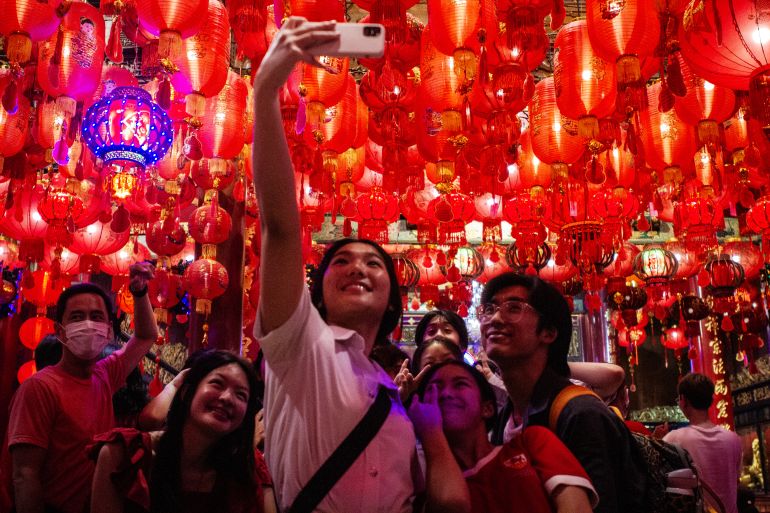
Bangkok, Thailand – Bangkok’s Chinatown, lit up by red-lanterns and decorative banners to celebrate the Lunar New Year holidays, is bustling.
As the region welcomed the Year of the Dragon last weekend, ethnic Chinese Thais thronged temples to light candles and pray for good fortune.

Keep reading
Two thai journalists arrested for reporting on temple vandalism, thailand’s former prime minister thaksin shinawatra to be freed, thailand, muslim separatists agree on new plan to end violence, former thai pm thaksin charged with royal insult.
Inside the glowing red interior of Wat Mangkon Kamalawat – the largest Chinese temple in Bangkok – women wore traditional cheongsam dresses and took photos with their loved ones.
Outside, in the hustle and bustle of Yaowarat Road, lion dancers performed as visitors – Thais and legions of tourists – crowded the street, sampling the food and shopping from stalls in the market.
Many were from China, with official figures showing hundreds of thousands of Chinese nationals chose to spend the holiday, which began on February 10, in Thailand where they no longer need to get a visa.
“Destinations in Southeast Asia traditionally rely on a strong Lunar New Year holiday to kick-start the tourism calendar,” Gary Bowerman, a tourism analyst in Kuala Lumpur, told Al Jazeera.
“Thailand has positioned itself astutely to capture outbound travel demand from China with its bilateral visa waiver and aggressive marketing into the Chinese market led by the prime minister. This resonates well with Chinese tourists and has encouraged Chinese airlines to add more capacity over [the] Chinese New Year.”

Thai Prime Minister Srettha Thavisin started his push to lure more arrivals from China in September when he announced a temporary visa waiver for Chinese tourists. The short-term agreement soon became permanent after Thailand and China signed an indefinite mutual visa exemption for their nationals to visit each other’s country starting from March 1.
Nithee Seeprae, deputy governor for marketing at the Tourism Authority of Thailand, says Chinese arrivals have been encouraging.
“It’s very exciting and [a] successful Chinese New Year, and it is a positive sign for the new visa waiver between China and Thailand because it brings more confidence for the Chinese tourists,” he told Al Jazeera. “Now we got 27-28,000 tourists [arriving each day] since the 1st of February, it is almost back to normal before Covid. Last year, at the same time, it was 7-8,000. Last month 500,000 [China visitors arrived].”
Thailand’s government spokesman Chai Wacharonke said on Saturday that four million tourists had arrived in the country from January 1 to February 8, including more than 730,000 Chinese.
Based on Nithee’s approximate figures, Chinese arrivals could reach one million by the end of the month.
“We have promotions with online travel agents, and [we] coordinate with normal travel agents to create a roadshow in the big cities in China. Also, the flights are back to 90 percent [capacity] like before the pandemic because of the visa waiving. We [are trying] to coordinate with influencers and key opinion leaders from China to create the content experience in Thailand,” he added.
More initiatives planned
Phuket, in southern Thailand, has seen an influx of arrivals in recent weeks.
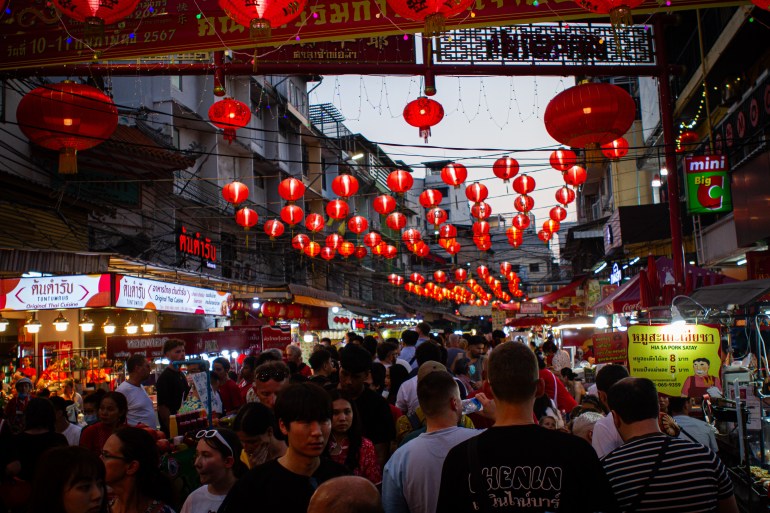
The island hotspot is expected to welcome 49,000 tourists a day through the international airport during the Chinese New Year period until February 16, according to local media.
The festival falls in the middle of Thailand’s high season, which usually runs from November to March, and is a major holiday for mainland China.
Ranjeet Viswanathan, the director of sales and marketing at the luxury Hyatt Regency Phuket Resort, said occupancy was even higher than many had hoped.
“This year has started with a bang. Every hotel has seen better-than-expected results in January and this continues in February. Our hotel has been doing over 92 percent in occupancy since January 1,” he told Al Jazeera.
Chinese tourists make up about 12 percent of the resort’s business and the number of travellers in 2024 so far is five percent higher than a year ago.
According to the Chinese calendar, 2024 is the Year of the Wood Dragon, which can be a time for new ideas, projects and prosperity.
Chinese visitors have long been crucial to the Thai travel industry, but even with the jump in arrivals, the numbers remain well below 2019, the year before the COVID-19 pandemic.
In that year, Chinese visitors made up more than 11 million of the record 39 million tourists who visited Thailand.
Last year, there were more than 3.5 million Chinese arrivals, but that still fell short of the five million predicted by Thai officials.
Experts put the lower-than-expected numbers down to China’s own economic issues and domestic travel trends. The mass shooting in a Bangkok shopping mall in September that killed one Chinese national, and the release of the Chinese blockbuster movie No More Bets, a film depicting scams in Southeast Asia , may have also played a part.
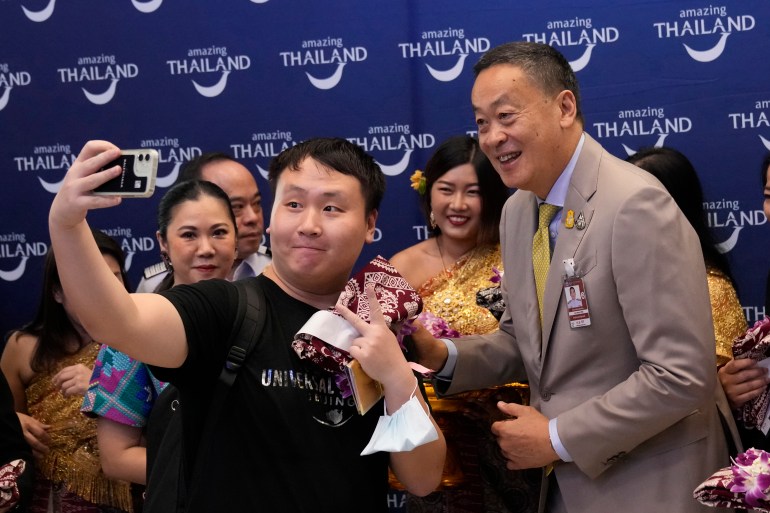
But the recent surge of Chinese visitors to Thailand shows China’s outbound travel is recovering, according to Bowerman, the tourism analyst.
“Strong demand for travel to Thailand from China in the first two months of 2024 suggests that this year will be very different for outbound travel from China compared to 2023,” he said.
Thai tourism officials have forecast more than eight million arrivals from China by the end of 2024.
The tourism authority’s Nithee is already working on luring more visitors from China and is in talks to arrange new flight routes from China into Thai cities including Udon Thani in the northeast and Hat Yai in the south. He is optimistic Thailand is on track to meet its arrivals target by the end of the year.
“It is really promising. We have to keep an eye on these situations and get more confidence for tourists and do more promotion,” he added.
- Sustainability
- Latest News
- News Reports
- Documentaries & Shows
- TV Schedule
- CNA938 Live
- Radio Schedule
- Singapore Parliament
- Mental Health
- Interactives
- Entertainment
- Style & Beauty
- Experiences
- Remarkable Living
- Send us a news tip
- Events & Partnerships
- Business Blueprint
- Health Matters
- The Asian Traveller
Trending Topics
Follow our news, recent searches, thailand seeks more chinese tourists but concerns over safety are hampering efforts, advertisement.
Thailand hopes to attract 4.4 million tourists from China by the end of this year. But with less than two months to go, it is still 1.5 million visitors short of its target.
This audio is AI-generated.

Pichayada Promchertchoo
BANGKOK: When Thailand’s tourism chief revealed a plan to engage Chinese police in joint patrols at major tourist destinations, it was a sign that the Southeast Asian nation was desperate to to draw more visitors from China.
It would reflect the kingdom’s commitment to strengthen security and boost confidence among Chinese tourists, announced Ms Thapanee Kiatphaibool, governor of the Tourism Authority of Thailand (TAT) after a meeting with Prime Minister Srettha Thavisin last Sunday (Nov 12).
The plan was swiftly scuppered – Mr Srettha and the national police chief denied it the following day after public outcry that it would compromise Thailand’s sovereignty.
Still, it is a clear sign that the Srettha administration knows restoring tourist confidence is pivotal. Perceived safety concerns sparked by a fatal shooting and a blockbuster crime thriller are keeping Chinese holidaymakers away, analysts say.
Slow economic recovery in China and limited flights to Thailand are also compounding matters, they pointed out, making it difficult for the Thai government to hit its tourism target this year.
Thailand hopes to draw 28 million foreign tourists, including 4.4 million from China, by the end of the year.
As of Nov 12, however, only 2.9 million Chinese tourists have visited, according to data from Thailand's Ministry of Tourism and Sports. This means the government needs to attract 1.5 million more Chinese visitors to reach its target.
“As we are entering the high season, there is a possibility but it will be hard,” Mr Paul Pruangkarn from the Pacific Asia Travel Association (PATA) told CNA.
Before the COVID-19 pandemic, China was Thailand's biggest source of international visitors, accounting for more than one in four of them. Out of 40 million foreign visitors in 2019, more than 11 million were from China.

Thailand drops joint patrols with Chinese police after public backlash

Thai economy likely grew in Q3 on exports, tourism boost
"it’s too unsafe".
One of the reasons they have been slow to return is the shooting in Bangkok’s luxury Siam Paragon mall last month. A Chinese national was one of two foreigners killed by a 14-year-old gunman, who also injured several people.
The woman had entered Thailand through its tourist visa exemption scheme launched for Chinese passport holders on Sept 25.
Following the shooting, the tourism ministry recorded a contraction of arrivals from China for four consecutive weeks before numbers started to pick up this month.
The immediate hit to Chinese sentiment was reflected in a poll on one of China’s largest social media platforms, Weibo, asking users if the incident would affect their travel plans to Thailand.
Over half of roughly 25,500 respondents, or about 14,400, answered: “Yes, it’s too unsafe.”
Some 3,500 others replied it would not affect their plan as such incidents do not happen often. Around 7,400 users said travelling within China is good enough, with some commenting it would be safest.
“Usually, incidents like these will have an impact that lasts two to three months, where we’ll see a drop in tourist numbers,” economist Ratasak Piriyanont from Kasikorn Securities told CNA.
Thailand’s tourism authority estimates a total income of 2.17 trillion baht (US$61 billion) from 28 million foreign visitors by December, with the visa-free incentive as an important driving force.
It also forecast the scheme would attract about 2.9 million tourists from China within five months. But a month and a half into the programme, data from the tourism ministry showed Chinese arrivals had not even reached 500,000.
Perceived safety concerns are among the key factors that could jeopardise the recovery of the Chinese market, said Mr Pruangkarn from PATA, even as a seamless travel experience can make Thailand a more attractive destination.
Who benefits from Thailand’s new tourism schemes
- Passport holders from China and Kazakhstan can enter and stay in Thailand for 30 days without a visa between Sep 25, 2023 and Feb 29, 2024
- Passport holders from India and Taiwan can do the same from Nov 10, 2023 to May 10, 2024
- Russian passport holders can enter and stay in Thailand for 90 days without a visa – instead of the normal 30-day period – from Nov 1, 2023 to Apr 30, 2024
A CRIME MOVIE THAT HURTS THAI TOURISM
Besides the gun attack last month, a Chinese blockbuster released in early August has also cast a shadow over Thailand’s tourism outlook, analysts said.
The crime thriller, No More Bets, tells a story of human trafficking victims lured from China to an unnamed country, where they are locked up in a scam mill, tortured and forced to swindle people online.
Online scam operations in Southeast Asia
- Hundreds of thousands of people from the region and beyond have been forcibly engaged in online crimes, according to the UN Human Rights Office
- An estimated 120,000 people across Myanmar are believed to be forcibly involved in online scams, along with some 100,000 others in Cambodia
- Victims of trafficking come from China, parts of South Asia and Southeast Asia as well as Africa
- Thailand is increasingly a transit country for these operations
Chinese viewership for the film exceeded 90 million as of late-September, according to film data platform Beacon, while revenue was at around 3.8 billion yuan (US$525 million).
Following the movie’s release, Thailand saw a drop in Chinese tourists. From 410,311 visitors in July, the figure dipped to 355,146 in August and 284,989 in September.
“Chinese people feel scared. They’re afraid of human trafficking and worried they wouldn’t be safe if they travel here,” said Mr Ratasak.
During his official visit to China last month, Mr Srettha had a meeting with Chinese President Xi Jinping and emphasised his government's commitment to ensure foreign tourists' safety following the Siam Paragon shooting incident.
The two leaders also discussed intensifying efforts to crack down on cross-border crimes such as wire fraud and online gambling.
LIMITED FLIGHTS, DOMESTIC FACTORS
Domestic factors have also hampered the return of Chinese tourists to Thailand.
Analysts say sluggishness in the world’s second-largest economy has reduced people’s spending power, especially those outside big Chinese cities. China's second-quarter gross domestic product growth of 6.3 per cent on-year was below expectations. But its third-quarter growth of 4.9 per cent year-on-year exceeded forecasts.
Meanwhile, limited international flights have affected outbound travel. “The frequency of flights from China to Thailand is still below pre-COVID numbers,” explained Mr Pruangkarn.
Online flight data provider OAG reported that out of China’s top 20 international markets since 2019, Thailand is the least recovered this month.
“Seats are still 57 per cent below 2019, despite the recent visa relaxation for Chinese visitors to Thailand,” it said on its website.
Still, market observers believe the Thai tourism sector could rebound in the near to medium term, given the right conditions and strategies.
“Thailand can boost Chinese arrivals by promoting Thailand as a safe destination that offers a variety of activities for all types of travellers, and by working with the airlines to increase flights from China,” said Mr Pruangkarn.

Commentary: Thailand must restore confidence it is safe for residents and tourists alike
Related topics, also worth reading, this browser is no longer supported.
We know it's a hassle to switch browsers but we want your experience with CNA to be fast, secure and the best it can possibly be.
To continue, upgrade to a supported browser or, for the finest experience, download the mobile app.
Upgraded but still having issues? Contact us
Thailand says 1 million Chinese tourists visited from January to mid-May
- Medium Text

The Reuters Daily Briefing newsletter provides all the news you need to start your day. Sign up here.
Reporting by Panarat Thepgumpanat; Writing by Orathai Sriring; Editing by Kim Coghill
Our Standards: The Thomson Reuters Trust Principles. New Tab , opens new tab

World Chevron
A woman brought a 68-year-old man in a wheelchair into a bank branch and tried to get him to sign for a loan, but he had been dead for hours, Brazilian police said on Wednesday.

Thailand: The return of Chinese tourists will boost Thailand’s economy
Share article.
China’s reopening is expected to have a booming impact on tourism in Asia. As a major tourism destination in the region, Thailand might be the first beneficiary and see its economic performance further improve in 2023, amid a weaker global economic environment.
Tourism is a major sector of Thailand’s economy. Prior to Covid-19, it generated more than 17% of the current account receipts and employed 20% of the population. The sector is expected to underpin the country’s good macroeconomic fundamentals, despite the deteriorating global economic environment. While the industry was still in limbo in 2021 due to the Covid-19 pandemic, the gradual and partial recovery in tourism observed in 2022 is expected to accelerate this year (albeit still far from its pre-Covid-19 levels). This projection largely rests on one factor: Chinese tourists. Following the lifting of travel restrictions and China’s border reopening, a wave of Chinese tourists is expected to spread across Asia, especially in Thailand. Indeed, in 2019, Thailand was the favourite destination of Chinese tourists; they accounted for more than 25% of Thailand’s total visitors.
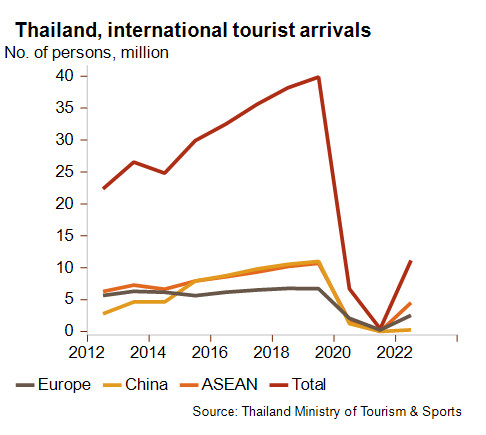
This would be a boon to Thailand in a year where Western demand for Thai manufactured exports is expected to sharply slow down. The reopening of China, Thailand’s second export market before Covid-19, could nevertheless partially offset this impact. Therefore, Thailand’s economy is expected to see a further improvement of its economic activity. In January, the IMF expected Thailand’s growth to pick up to 3.7% this year (from 3.2% in 2022). The main risk to the tourism outlook could come from the general elections next May if the outcome is contested and leads to protests against the military-backed regime that has been in place since 2014.
An economic strengthening would further increase resilience and confidence in the outlook and government policies. This is highlighted by a strong baht. The Thai currency has appreciated by 5% against the US dollar over the past 12 months, making it the most resilient currency in Asia.

Improved tourism prospects are also expected to enable the current account balance to return into surplus this year, as it has mostly been the case this century. It might contribute to reverse the annual decline in foreign exchange reserves of the past two years. In the end of 2022, their volume covered less than 7 months of imports, which represents a nine-year low.
In addition to the weakening external demand, the persisting war in Ukraine is another downside risk to the outlook, as it will continue to swell import costs and fuel energy inflation pressures. In 2022, inflation reached an average of 6.3%. However, it has been slowing over the past months to 5% in January on the back of moderating energy prices and the Bank of Thailand’s monetary tightening. Interest rates have been raised several times since August, reaching 1.5% at the end of January, with the aim of bringing inflation in the 1 to 3% range. The boost from Chinese tourism could slow down the gradual inflation moderation during the year.
Based on those various risk factors and expected economic developments, the outlook for Credendo’s short-term political risk and business environment risk ratings is positive.
Analyst: Raphaël Cecchi – [email protected]
- International edition
- Australia edition
- Europe edition

The Chinese émigrés leaving the pressures of home for laid back Chiang Mai
Thai tourist hotspot popular with backpackers has become an unlikely second home for thousands of Chinese people seeking alternative lifestyles
A pproaching her mid-30s, Xiong Yidan reckons that most of her friends are on to their second or even third babies. But Xiong has more than a dozen. There is Lucky, the street dog from Bangkok who jumped into a taxi with her and never left. There is Sophie and Ben, sibling geese, who honk from morning to night. Boop and Pan, both goats, are romantically involved. Dumpling the hedgehog enjoys a belly rub from time to time. The list goes on.
Xiong nurtures her brood from her 8,000 square metre farm in Chiang Dao, a mountainous district in northern Thailand’s Chiang Mai province. Xiong has chronicled her journey from Beijing cryptocurrency marketing executive to farm girl in Thailand on social media; she’s particularly popular on Xiaohongshu, a female-focused app similar to Instagram, where she has more than 38,000 followers. Her account shows people that switching to a slower pace of life “is not just some illusion or idealistic thing, but is very actionable,” she says.
Moving to Thailand has allowed her to have a “multiverse version” of herself, where she can be a farmer, an influencer, a businesswoman and a single, child-free woman, away from the pressures of Chinese society.

Xiong is part of a burgeoning trend of Chinese people – particularly millennials – who feel that the country that was supposed to be the powerhouse of the 21st century has little to offer them personally in social, intellectual and spiritual terms. In recent years, an economic downturn and lingering trauma from the isolation of China’s draconian zero-Covid regime has pushed people who would otherwise be seen as the country’s success stories to emigrate.
“It felt like the end of the world,” says Linda Xu, of the Shanghai lockdown. Until March 2022, she was the general manager of a successful skateboarding start-up in Shanghai, but now she spends much of her time in Chiang Mai, “figuring out what the next chapter might be”.
Art, books, free speech

Chiang Mai, a tourist hotspot popular with backpackers and nature-lovers, has become an unlikely second home for thousands of new Chinese émigrés. More than 110,000 Chinese nationals applied for long-term visas in Thailand between January and September in 2022, nearly the total number for 2019. Nearly half of the members of Thailand’s “elite card” visa scheme, which offers long term residency rights for a fee starting at 900,000 Thai Baht (£19,400) are Chinese. Thousands of them are settling in Chiang Mai, attracted by the city’s laid back atmosphere and permissive social environment – with or without the legalised marijuana.
Cannabis has never been freely available in the People’s Republic of China. But it was not so long ago that China’s big cities were replete with independent bookstores, cinemas and social spaces where like-minded people could meet openly to discuss topics such as feminism, LGBT issues, philosophy and anything else that might interest them. While certain topics were always forbidden, the country’s intelligentsia navigated these red lines with relative ease. But after more than a decade of increasingly iron-fisted rule by Xi Jinping, few, if any, of these spaces remain.

So it is that Nowhere Bookstore opened in Chiang Mai in November 2023, after the launch of its sister shop in Taipei the previous year. Founded by Zhang Jieping, a mainland-born journalist who is now based at Harvard University, the small space stocks material on topics that would be impossible to discuss openly in China, such as the 2022 white paper protests and the 1989 Tiananmen Square massacre. “There are many books that you can’t see or buy in mainland China,” says a young designer from Guangzhou who seized the opportunity to visit the shop while on holiday in Thailand, saying that she otherwise has to rely on the “fragmented information” of the Chinese internet.
As well as selling books, Nowhere also hosts Chinese-language events on wide-ranging topics for the growing Chinese community in Chiang Mai. At a recent event, the 62-year-old writer Zheng Shiping spoke about spending his retirement years in exile. Zheng started his career as a policeman in the 1980s but quit the force after Tiananmen Square massacre, and went on to become a renowned poet and writer, working under the pen name Ye Fu. He arrived in Thailand at the end of 2019, having heard from doctors in Wuhan, the capital of his home province of Hubei, about a virus that was spreading dangerously fast in the city.

“Thailand is certainly not as safe as the US, Europe or Japan,” he says, acutely aware of the fate of Gui Minhai , a Swedish bookseller who was kidnapped from Thailand in 2015, reappearing months later in Chinese custody, an incident which spooked dissidents in Thailand. “But it’s still basically a country with free speech. It basically protects human rights”.
Zheng is part of an older cabal of expats who have established a retirement village-meets-arts community in a suburb of Chiang Mai. Unlike the millennial transplants, this older generation was forged in China’s more liberal era of the 1980s, and have a more political perspective about the country’s trajectory. “We were hopeful, a generation of people who made great sacrifices and efforts, but ultimately failed,” says Zheng. “Young Chinese today are more desperate than we were then. In the next few years, they will be unemployed, their lives will be in crisis, and their rights as human beings will diminish little by little.”
For Du Yinghong, an artist, part of the reason he emigrated was because he believes that “art is dead” in his home country. “It’s spiritually unsatisfying, materially unsatisfying,” he says. As well as the low cost of living in Thailand, Du was attracted to the country’s Buddhism. Thailand is thought to be home to the second-largest number of Buddhists in the world after China, and as a share of the population, it is far more prevalent in Thailand, with 90% of adults claiming adherence to the faith, according to Pew Research Centre . “Chinese Buddhism is Buddhism in quotation marks,” says Du, aged 48. “There is no real Buddhism in China, there is no real Christianity, there is no real Islam … it’s all fake. Of course, there are a lot of really devout people in China, good people, but what they do, or believe in, it’s in a specific kind of political environment, it doesn’t allow you to have real faith”.
Many of the Chinese in Thailand say that they are attracted to the idea of a less consumerist, more peaceful lifestyle, informed by Thailand’s Buddhist principles. With the highest rate of inequality in east and south-east Asia, Thailand’s appeal may be informed more by the fact that the low cost of living allows relatively wealthy Chinese to have a slower pace of life in Chiang Mai than they could afford in Chongqing. Nonetheless, the space Thailand offers for people looking for a more spiritual life is another draw for Chinese who feel increasingly suffocated at home.
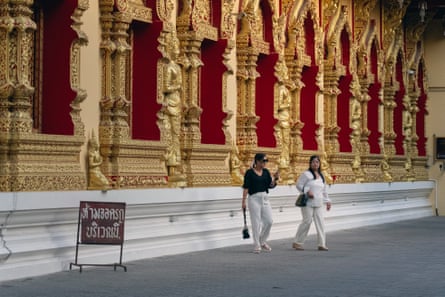
F ounded in 2010, Panyaden International School is a school made nearly entirely out of bamboo that offers an education based on Buddhist principles, known as bhavana. Staff participate in an annual silent meditation retreat and the students harvest their own rice from a nearby paddy field, to learn about the effort that goes into feeding the planet. More than 10% of the students are from China, and although fees reach up to 549,000 Thai baht (£11,900) a year, that is still only around a third of the cost of top international schools in Beijing. Chinese parents are drawn to the fact that the school offers an international, diverse education for their children, while also being rooted in Asian values, says Gloria Niu, a Chinese lecturer at Chiang Mai University who sends her own daughter to Panyaden. One of the school’s “12 wise habits”, which teachers emphasise to children, is the value of “knowing the right amount”, a reference to the idea of not consuming too much, or too little.There is also an in-house spiritual adviser. It is an approach to education that is unimaginable in mainstream, hyper-competitive Chinese schools.
Xiong says her parents feel that the money they spent on her education has been “flushed down the toilet”. But living in Thailand is “the only way I have the freedom to do whatever I want,” she reflects. “Without actually actively choosing it, I am having this kind of feminist lifestyle.”
- Asia Pacific
Most viewed
- Election 2024
- Entertainment
- Newsletters
- Photography
- Personal Finance
- AP Investigations
- AP Buyline Personal Finance
- Press Releases
- Israel-Hamas War
- Russia-Ukraine War
- Global elections
- Asia Pacific
- Latin America
- Middle East
- Election Results
- Delegate Tracker
- AP & Elections
- March Madness
- AP Top 25 Poll
- Movie reviews
- Book reviews
- Personal finance
- Financial Markets
- Business Highlights
- Financial wellness
- Artificial Intelligence
- Social Media
Thailand’s government, seeking return of tourists from China, approves visa-free entry for 5 months
FILE - Chinese family tourists rent traditional Thai costumes and take selfies at Wat Arun, or the “Temple of Dawn,” in Bangkok, Thailand, on Jan. 12, 2023. Thailand’s new cabinet has approved a temporary visa exemption for tourists from China and Kazakhstan in its first meeting on Wednesday, Sept. 13, for a bid to boost tourism and the economy. (AP Photo/Sakchai Lalit, File)
FILE - A Chinese tourist rents traditional Thai costumes and poses for a photographer at Wat Arun, or the “Temple of Dawn,” in Bangkok, Thailand, on Jan. 12, 2023. Thailand’s new cabinet has approved a temporary visa exemption for tourists from China and Kazakhstan in its first meeting on Wednesday, Sept. 13, for a bid to boost tourism and the economy. (AP Photo/Sakchai Lalit, File)
- Copy Link copied
BANGKOK (AP) — Thailand’s new government Wednesday approved a measure granting temporary visa-free entry to Chinese tourists, signaling that the recovery of the country’s tourism industry is a top economic priority.
Prime Minister Srettha Thavisin said the visa exemption, which will also apply to visitors from the Central Asian nation of Kazakhstan, will be effective from Sept. 25 until Feb. 29 next year. He said the relevant authorities had been consulted to ensure they are ready to handle the expected surge in travelers.
China more than a decade ago became a major source of tourists to Thailand, with almost 11 million visitors in 2019, accounting for 27.6% of all arrivals the year before the coronavirus pandemic devastated the tourist market.
The government proposed the measure due to concerns that the number of Chinese tourists this year might not reach the initial target of 5 million due to strict visa requirements. The Tourism Authority of Thailand reported that around 1.4 million Chinese tourists came in the first six months of this year.
Thailand’s economy slumped during the pandemic as its huge tourism industry virtually collapsed. The country received about 40 million international visitors in 2019 who the government estimated generated 1.9 trillion baht ($53.2 billion) in revenue, an amount that plummeted by more than 99% by 2021, according to data from the Ministry of Tourism and Sports.
Chai Wacharonke, a spokesperson for the Office of the Prime Minister, said Thailand received 15 million international visitors in the first seven months of this year. He said the government aims to draw 28 million international visitors and generate 1.4 trillion baht ($39.2 billion) in tourism revenue in 2023.
Chai praised the visa exemption scheme, saying the tourism industry is “the only economic machine remaining that can be driven with hope to generate new income quickly for Thailand.”
Besides the visa exemption, other measures the Cabinet approved included a reduction in electricity fees and diesel prices, as well as a three-year debt relief program for farmers, to address the higher cost of living and other economic woes.
The Straits Times
- International
- Print Edition
- news with benefits
- SPH Rewards
- STClassifieds
- Berita Harian
- Hardwarezone
- Shin Min Daily News
- Tamil Murasu
- The Business Times
- The New Paper
- Lianhe Zaobao
- Advertise with us

Drop in Chinese travellers likely to derail Thailand’s tourism target of 30 million visitors

BANGKOK – Thailand is likely to miss its goal of hosting 30 million foreign tourists in 2023 amid fewer-than-expected visitors from China, according to Malaysia’s RHB Bank.
RHB Bank senior economist Barnabas Gan wrote in a note that inbound arrivals from China to Thailand for 2023 could drop slightly below five million, below the seven million expected by the Thai government.
The possibility of China’s economic activity slowing in the second half of 2023 will crimp demand for outbound tourism, he said.
Figures from hotel commerce platform SiteMinder, Chinese shopping site Meituan and the Tourism Authority of Thailand released this week revealed that more than 1.3 million travellers to Thailand in 2023 were from China.
Foreign travellers entering Thailand reached 12.5 million from Jan 1 to June 25, according to the Tourism and Sports Ministry.
Overall tourist arrivals to Thailand have topped two million every month between December and May.
As a result, Thailand’s annual foreign tourist arrivals will be between 26 and 28 million in 2023, according to RHB.
That will still be twice 2022’s tally of 11.2 million.
Thailand welcomed about 40 million tourists before the Covid-19 pandemic in 2019, with Chinese tourists making about a quarter of the total visitors.
“We expect full-year tourism arrivals to disappoint official estimates,” Mr Gan wrote. “Thailand’s tourism prognosis remains at best, neutral, given the recent slowdown in inbound tourism momentum.”
He also cited rising tourism-led competition from neighbouring countries and exacerbated domestic political noise as additional factors affecting Thailand’s tourism recovery outlook going forward.
The bearish outlook for inbound Chinese visitors is also echoed by the Thai travel agent operators.
The tally is seen below five million on visa issues and safety concerns, according to the Association of Thai Travel Agents.
Media reports about tourist extortions and safety have dented confidence among Chinese travellers, according to association president Sisdivachr Cheewarattanaporn.
The government needs to push for more arrivals between July and September, the period coinciding with summer vacations in China, to drive up tourism recovery, said Mr Sisdivachr. BLOOMBERG
Join ST's Telegram channel and get the latest breaking news delivered to you.
Read 3 articles and stand to win rewards
Spin the wheel now

- China Daily PDF
- China Daily E-paper
- Asia-Pacific
- Middle East
- China-Europe
- China-Japan
- China-Africa

Thailand looks to woo 8m Chinese tourists

Thailand's tourism industry has started looking up. With consumer spending at this year's traditional Loy Krathong Festival expected to hit an eight-year high, the country's tourism authority has announced that it aims to attract more than 8 million Chinese tourists next year.
At a news conference on Tuesday, the Tourism Authority of Thailand, or TAT, said it would continue to promote the country as one of the world's most popular travel destinations, and aims to attract more foreign tourists, especially from China.
TAT Governor Thapanee Kiatphaibool revealed that the authority is confident the total foreign arrivals this year will exceed its target of 25 million people.
Although the tourism authority had lowered its expectations of Chinese tourist arrivals from the previous 5 to 7 million to about 3.4 million this year, the authority estimated that Chinese arrivals next year will rise to more than 8 million due to an increase in the number of flights and better economic conditions.
"Thailand is well-known for its diversified tourism experiences and great services. And we will strengthen efforts to ensure the safety of tourists to further attract foreign visitors, especially from China," Thapanee said, adding that Chinese tourists may help to generate 452 billion baht ($13 billion) in tourist receipts next year.
For the past few days, people from all over Thailand have been taking part in the Loy Krathong Festival to celebrate the full moon. Residents and tourists gathered in the evening at lakes, rivers, canals, and beaches to pay their respects to the river goddess by floating krathongs — banana leaf "rafts" decorated with flowers, incense and candles.
Top destinations
The spending for this year's Loy Krathong Festival is estimated to increase by 3.3 percent from the previous year to 10 billion baht, according to a survey by the University of the Thai Chamber of Commerce.
Although Thailand faces intense competition from other countries that have also offered visa exemptions to Chinese travelers, Thapanee said the country is still among the top destinations for tourists from the Chinese mainland.
China was Thailand's biggest source of international visitors before the COVID-19 pandemic, accounting for nearly 11 million arrivals in 2019, according to official statistics.
This year, however, Malaysians contributed the most to total foreign arrivals at 3.66 million people so far, followed by Chinese (3.03 million), South Koreans (1.43 million), Indians (1.4 million) and Russians (1.24 million).
In a bid to attract more visitors, the Thai government announced a temporary visa exemption for a 30-day stay for Chinese and Kazakh nationals. It started on Sept 25 and is scheduled to expire on Feb 29 next year.
Chattan Kunjara Na Ayudhya, TAT's deputy governor for international marketing in Asia and South Pacific, said in a recent interview with Bangkok Post newspaper that the authority is planning a media trip to invite more than 100 Chinese key opinion leaders to explore new activities and destinations in Thailand, along with testing safety measures for tourists.


Phiphat Ratchakitprakarn, Minister of Tourism and Sports of Thailand, Yuthasak Supasorn, Governor of the Tourism Authority of Thailand, and Lei Haisu, chairman of CTG Travel Service Co at the signing ceremony in Beijing on February 22, 2023 Photo: Courtesy of the Tourism Authority of Thailand

Three years after the pandemic, the first tour groups from China arrived Monday in the Thai capital of ...


StringersHub
Songkran festival kicks off in Thailand, attracting Chinese tourists
Posted: April 15, 2024 | Last updated: April 15, 2024
Water gun spray and festive parades have taken to the streets across Thailand for the Songkran Festival, the annual celebration of the Thai New Year that has attracted swaths of visitors from China and around the world. During the Songkran Festival, celebrated from April 13 to 15 every year, it is traditional to greet others with splashing water. Over 1,000 performers and dozens of floats amazed visitors in a major parade in Bangkok that showcased the diverse traditional cultures of the Southeast Asian country. The holiday has become better known internationally since it was listed as part of the country's intangible cultural heritage by the United Nations Educational, Scientific and Cultural Organization (UNESCO) last December. To better accommodate an influx of global tourism, Thai authorities prepared Songkran songs in four languages, namely Thai, Chinese, English and French, to mark the grand occasion. Thai Prime Minister Srettha Thavisin said the country hopes to receive more Chinese tourists especially after the mutual visa exemption policy between China and Thailand came into force on March 1. "The mutual visa exemption agreement between the governments of China and Thailand officially took effect on March 1 this year, and the favorable policy has brought large numbers of Thai nationals to travel to China, resulting in the full booking of almost every flight. It has effectively facilitated the exchanges between the two countries, and the number of Chinese tourists visiting Thailand ranks the top among all international tourists," said the prime minister. Data from the Thai Ministry of Tourism and Sports showed that Thailand received over 9.37 million foreign tourists in the first three months of 2024, including 1.75 million visitors from China being the largest source. SHOTLIST Bangkok, Thailand - April 10, 2024 1. Various of people splashing water to mark Songkran Festival; 2. Various of float parade, other celebration activities for Songkran Festival in progress; 3. SOUNDBITE (Thai) Srettha Thavisin, Prime Minister of Thailand (partially overlaid with shot 4): "The mutual visa exemption agreement between the governments of China and Thailand officially took effect on March 1 this year, and the favorable policy has brought large numbers of Thai nationals to travel to China, resulting in the full booking of almost every flight. It has effectively facilitated the exchanges between the two countries, and the number of Chinese tourists visiting Thailand ranks the top among all international tourists."; [SHOT OVERLAYING SOUNDBITE] FILE: Shenzhen City, Guangdong Province, south China - March 1, 2024 4. Various of travelers queuing at immigration inspection area; [SHOT OVERLAYING SOUNDBITE] Bangkok, Thailand - April 10, 2024 5. Various of celebration activities for Songkran Festival in progress. [RESTRICTIONS: No access Chinese mainland]
More for You
The Russian Orthodox Church declares ‘holy war’ against Ukraine and the West
A Ukrainian ally is sending Kyiv F-16s for deep strikes into Russia's rear
From Audrey Hepburn to Clark Gable: famous people worked for the Allies during WWII
Man Utd: The two ‘current frontrunners’ to replace Ten Hag revealed amid second chance suggestion
How the future predicted in ‘1984’ has come true
Make smacking illegal in all UK nations, child health chiefs urge
Russia has a new target and hopes to capture it soon
Russia withdrawing from Nagorno-Karabakh, Kremlin says
What are eVTOL aircraft, and can they fly against the hype?
12 fab cars with five-cylinder engines
Champions League: Why we eliminated Barcelona – PSG coach, Luis Enrique
Fury as it's revealed US and Chinese lab are creating deadly viruses
Remember when Ukraine successfully hit a critical Russian bridge three times?
Do you know where all the world's ultra wealthy people live?
Ukrainian Romani people are facing discrimination in Germany
Ukraine could not thwart Russian airstrike on power plant as it ran out of missiles: Zelenskyy
The growing trend: Why couples opt to live separately
History's greatest minds and their struggles with mental health
Half of workers claim AI already does a better job than them
Iranian weapons meant for rebel group are on route to Ukraine

- The Star ePaper
- Subscriptions
- Manage Profile
- Change Password
- Manage Logins
- Manage Subscription
- Transaction History
- Manage Billing Info
- Manage For You
- Manage Bookmarks
- Package & Pricing
Chinese man covers buffet bill after compatriots flee Bangkok restaurant
Wednesday, 17 Apr 2024
Related News

Thailand, N. Zealand ink MoUs on education, aviation cooperation
Foreign arrivals in thailand surpass 10-million mark this year; malaysians second biggest visitors after china, thailand now ranked second in food tourism but still behind frontrunner japan, according to international survey.
The owner of About Beef Lava Grill in Bangkok did not release the name of the man when he posted his picture on his restaurant’s Facebook page. - The Nation/ANN
BANGKOK: Embarrassed by two of his compatriots’ bad behaviour, a Chinese man came to a Bangkok buffet restaurant to pay a bill of 2,600 baht (US$70) after a clip of two Chinese women fleeing without paying went viral on Chinese social media.
The owner of About Beef Lava Grill in Bangkok did not release the name of the man when he posted his picture on his restaurant’s Facebook page on Tuesday (April 16) night.
The post said that after a clip of two Chinese women fleeing from the restaurant on April 12 instead of paying their bill of 2,696 baht, a good citizen of China came to the shop to pay it.
The post said the Chinese man could speak a little Thai, and recounted that a clip of the two women fleeing the shop went viral in China.
The man said he was embarrassed by the behaviour of the two Chinese tourists, whom he did not know.
The post quoted the man as saying that he felt sorry for the loss to the restaurant so he decided to pay the bill.
After the shop realised that the two tourists had fled without paying the bill, it posted footage from the shop’s security cameras in the night of April 12.
The footage showed the two young Chinese women – one in white dress and another in black – bolting from the shop to their parked car and speeding off.
The post pleaded with the two to come back to pay the bill or else employees in charge of overseeing their table would have to shoulder the cost. - The Nation/ANN
Tags / Keywords: Thailand , Bangkok , buffet , bill , China , women
Found a mistake in this article?
Report it to us.
Thank you for your report!

Elevating enterprise mobility
Next in aseanplus news.

Trending in AseanPlus
Air pollutant index, highest api readings, select state and location to view the latest api reading.
- Select Location
Source: Department of Environment, Malaysia
Others Also Read
Best viewed on Chrome browsers.

We would love to keep you posted on the latest promotion. Kindly fill the form below
Thank you for downloading.
We hope you enjoy this feature!
Chinese Tourists Continue Love Affair With Iceland, Kazakhstan is New Favorite
Peden Doma Bhutia , Skift
April 16th, 2024 at 10:52 AM EDT
Think Iceland was an unexpected favorite for Chinese tourists, what would you say about Kazakhstan?
Peden Doma Bhutia
Kazakhstan and Iceland have emerged as favored destinations among Chinese tourists, while Thailand continues to struggle with perceptions of safety, according to Dragon Trail International’s latest Chinese consumer sentiment research.
The data was shared exclusively with Skift. On Wednesday, data firm ForwardKeys and Dragon Trail will be sharing these insights in a webinar.
Iceland first emerged as an unexpected favorite in Dragon Trail’s August 2023 survey, and it continues to remain in the top 10 most coveted outbound destinations . It is boosted by depictions of natural attractions, such as aurora borealis and volcanos on Chinese social media and reality TV.
Janice Meng, a market research analyst at Dragon Trail, emphasized the impact of popular reality shows. The TV show “Divas Hit The Road” helped familiarize Chinese tourists with Iceland, she said.
“Multimedia content has made the deepest impression on Chinese travelers, with video and live streaming emerging as the most eye-catching formats,” Meng added.
The easing of visa requirements has also been instrumental in attracting Chinese travelers. Following the relaxation of visa rules in 2023, travel from China to Kazakhstan skyrocketed 115%.
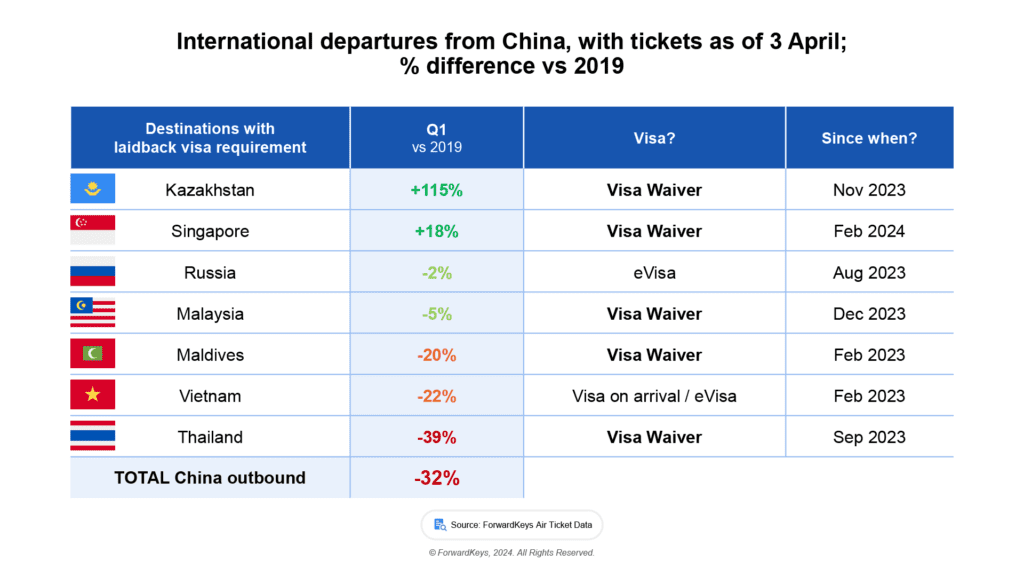
According to Nancy Dai, China market analyst at ForwardKeys, Kazakhstan’s standout performance is also driven by a 23% increase in seat capacity.
Affordability of travel packages and the allure of winter activities have also propelled Kazakhstan’s appeal among Chinese tourists, especially as winter destinations are becoming increasingly popular, said Dai.
Thailand Lags Behind
However, despite the visa-free arrangement , Thailand’s performance in Chinese outbound travel has been lackluster due to safety concerns stemming from a shooting incident last year in October, said Dai.
Dragon Trail’s survey ranked Thailand 17th out of 20 outbound destinations for safety, with 38% of Chinese travelers considering it “unsafe” to visit.
“This suggests that while visa waivers are a major draw for Chinese travelers, other factors like safety concerns and flight connectivity also play a crucial role when they are choosing a holiday destination,” Dai added.
Speaking earlier to Skift, Boon Sian Chai, managing director and vice president of international markets at Trip.com Group, had mentioned that no matter how alluring outbound travel may be, safety and security information is most crucial for Chinese travelers.
However, Dragon Trail noted that Chinese perceptions of safety abroad are improving overall. More than a year post-China’s reopening, fears about international safety are diminishing, with the sense of safety increasing for 10 out of 12 destinations surveyed.
Hong Kong was voted the safest outbound destination, followed by Singapore, Switzerland, and Australia, reflecting a broader shift in Chinese travelers’ attitudes towards international destinations.
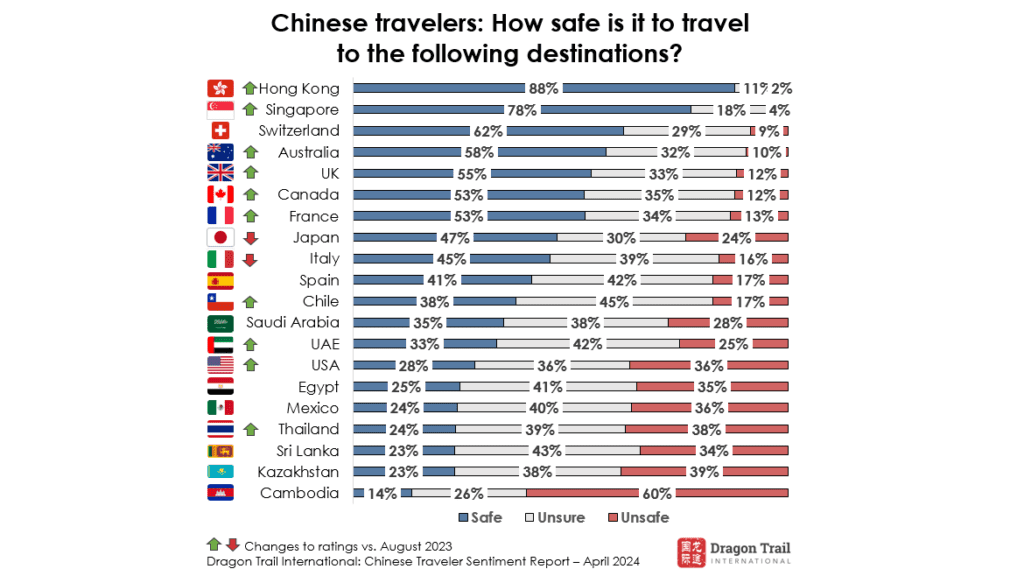
“It’s very promising to see that in the eyes of Chinese travelers, the world seems to be getting safer. Safety perceptions have improved for destinations around the world, and fears surrounding Covid-19 have dissipated,” said Sienna Parulis-Cook, Dragon Trail’s director of marketing and communications.
Return of the Chinese Outbound Travel
ForwardKeys also noted that Chinese outbound travel is gradually returning to pre-pandemic levels. In the first quarter of 2024, the number of issued flight tickets from China was 32% below the first quarter of 2019 levels, according to the travel firm.
As of April 3, bookings for the upcoming May holiday are only 13% down, compared to the same period in 2019, ForwardKeys said.
Dragon Trail noted that the intention to travel outbound has grown, with increased attention on long-haul destinations
Chinese travelers are also more likely to be planning intercontinental trips, with almost 40% saying they plan to or want to visit a region outside Asia in 2024. Europe emerged as the leading long-haul region with France topping the list, followed by Iceland.
Within the region South Korea was the most popular country for 2024 outbound travel plans, followed by traditional hotspots Thailand and Japan, and newly visa-free Singapore.
The Daily Newsletter
Our daily coverage of the global travel industry. Written by editors and analysts from across Skift’s brands.
Have a confidential tip for Skift? Get in touch
Tags: asia monthly , china , china outbound , coronavirus recovery , data , iceland , safety , thailand , trip.com
Photo credit: Iceland has emerged as favored destinations among Chinese tourists. Marriott International
We've detected unusual activity from your computer network
To continue, please click the box below to let us know you're not a robot.
Why did this happen?
Please make sure your browser supports JavaScript and cookies and that you are not blocking them from loading. For more information you can review our Terms of Service and Cookie Policy .
For inquiries related to this message please contact our support team and provide the reference ID below.
- Economic Watch: Water-splashing festivals boost tourism in China, Southeast Asia
KUNMING, April 17 (Xinhua) -- When Cambodian student Tim Chivorn immersed himself in the just-concluded water-splashing festival in Xishuangbanna Dai Autonomous Prefecture, southwest China's Yunnan Province, he was delighted to find the festive traditions there to be similar to those in his hometown.
"The enthusiasm of Yunnan people makes me feel warm, and it reminded me of my hometown when I splashed water here," said Chivorn.
The water-splashing festival is regarded as one of the most important festivals of ethnic groups in southwest China. During the festival, water is considered an auspicious symbol and people splash water on one another, thereby wishing happiness and good fortune. In Southeast Asia, many countries celebrate this kind of water festival. It is known as the Khmer New Year in Cambodia, while it is called the Songkran Festival in Thailand.
Recently, the water-splashing festival in China's Yunnan and the Songkran Festival in Thailand attracted large numbers of foreign visitors, and celebrating such water festivals abroad has become a new trend for tourists from various countries and regions.
According to the border checkpoint in Kunming, capital of Yunnan, Kunming Port handled about 57,000 inbound and outbound passengers during the water-splashing festival -- a massive year-on-year increase of 298.8 percent.
"I have been to Xishuangbanna many times, but this is the first time I have come to celebrate the water-splashing festival. I feel very happy to enjoy these splendid activities," said Jaruwan Udomsap, a Thai who has lived in China for more than 10 years.
She did not return to Thailand this year, choosing instead to spend the water festival in China's Xishuangbanna, which is full of ethnic and cultural diversity, according to Udomsap.
This year's water-splashing festival was held from April 13 to 15 in Xishuangbanna, and featured various cultural activities each day, such as releasing sky lanterns, traditional dance performances and so on. On the last day of the festival, locals dressed in ethnic costumes celebrated the festival by splashing water on each other.
Udomsap said that in Thailand, people start splashing water on each other from the first day of the water festival and the water-splashing activities usually last three days and serve as a celebration of the arrival of the Thai New Year.
"Although the names of the festivals are different in the two countries, the expectation of good fortune and happiness is the same," Udomsap added. She plans to spend the next water-splashing festival in Dehong Dai and Jingpo Autonomous Prefecture in Yunnan.
Since the mutual visa-free agreement between China and Thailand came into effect, the level of tourism between these two countries has increased significantly. During the water-splashing festival in Yunnan, over 5,000 Thai tourists entered China via Kunming Port, making Thailand the biggest source of inbound tourists during the period. Meanwhile, nearly 10,000 Chinese tourists departed from Kunming to Thailand during the first three days of the Songkran Festival.
Liang Kaiting, a Chinese student in Bangkok, Thailand, was pleasantly surprised to find that there were many Chinese tourists on the streets of Bangkok when she and her classmates experienced the Songkran Festival.
"We have met a lot of Chinese people, and we could feel the joy in the air together," Liang said. She participated in the water-splashing activities for two days, and it was very common for her to come across Chinese tourists who had traveled to Thailand especially for this festival.
Taking advantage of various festivals, China's tourism market is showing continuous and growing vigor.
According to the Mohan checkpoint on China's border with Laos in Yunnan, China-Laos Railway trains were packed with Chinese passengers who traveled to celebrate the water festivals in Laos and Thailand, while many foreign passengers from Laos and Thailand also took the trains to experience the water-splashing festival in China.
Each international passenger train offers 350 seats for cross-border travel, and the recent capacity rate has exceeded 90 percent. Foreign tourist numbers increased 88.97 percent compared with the same period last year, with Thai tourists accounting for nearly 40 percent of total foreign visitors, local railway authorities in Mohan revealed.
To meet increased travel demand, Chinese and Lao railway authorities on April 13 launched one more pair of trains to boost the China-Laos Railway international passenger service. Thanks to the high level of service on offer, passengers can complete the round trip between Xishuangbanna and Luang Prabang of Laos within one day, which greatly improved the convenience of cross-border tourism during the recent water festivals.
The huge flow of tourists drawn by the water festival helped fuel the consumption market in Yunnan. Zhao Jun, the owner of a restaurant in the city of Mangshi of Dehong Dai and Jingpo Autonomous Prefecture, said that during the water-splashing festival, her restaurant had received more than 200 tables of diners each day.
According to local authorities in Mangshi, from April 11 to 14, the city welcomed a total of 282,800 tourists, generating tourism revenue topping 297 million yuan (about 41.8 million U.S. dollars).
"The Dai costumes in Xishuangbanna are so beautiful, while the water-splashing festival there is so much fun," commented Udomsap's Thai friends on social media after she posted photos of this year's exotic water festival experience. Her friends are also attracted by the local ethnic charms and hope to come to China next year for the water-splashing festival, Udomsap added. Enditem
Go to Forum >> 0 Comment(s)
Add your comments....
- User Name Required
- Your Comment

IMAGES
VIDEO
COMMENTS
12/05/2023 December 5, 2023. Thailand's tourism bureau estimates nearly 1.5 million fewer visitors from China in 2023 than had originally been expected at the beginning of the year.
In 2019, Thailand was the most-visited international destination by Chinese travelers, welcoming around 11 million tourists — over a quarter of the country's overseas arrivals. Only Hong Kong ...
Thailand's government spokesman Chai Wacharonke said on Saturday that four million tourists had arrived in the country from January 1 to February 8, including more than 730,000 Chinese.
FILE - Chinese tourists visit Pung Tao Gong Chinese Temple in Chiang Mai province, northern Thailand, Jan. 23, 2023. washington —. Thailand's tourist industry hoped for a quick revival when ...
A Thai official gives a garland to Chinese tourists as they arrive at Suvarnabhumi International Airport in Samut Prakarn province, Thailand, Monday, January 9, 2023. Three Cabinet ministers ...
Chinatown in Bangkok. China accounted for about a third of visitors to Thailand before Covid, which decimated tourism. About 5 million Chinese are predicted to visit this year in a welcome boost ...
Thailand's golden beaches, shopping districts and ornate temples are filling with tourists once again and Chinese vacationers are getting an especially VIP welcome under a new visa-free scheme.
Published 3:55 AM PDT, January 9, 2023. BANGKOK (AP) — Three Cabinet ministers welcomed Chinese tourists with flowers and gifts as they arrived Monday at Bangkok's Suvarnabhumi Airport after China relaxed travel restrictions. The high-profile event reflected the importance Thailand places on wooing back Chinese travelers to help restore its ...
About 3.01 million Chinese tourists have visited the country so far this year, it said. China has been a key source market for Thailand's vital tourism industry, with 11 million Chinese visitors ...
Chinese tourists dance with puppet as Chinese tourists are welcomed on the arrivals at Suvarnabhumi International Airport in Samut Prakarn province, Thailand, Monday, Sept. 25, 2023. Thailand's new government granting temporary visa-free entry to Chinese tourists, signaling that the recovery of the country's tourism industry is a top ...
Thailand hopes to draw 28 million foreign tourists, including 4.4 million from China, by the end of the year. As of Nov 12, however, only 2.9 million Chinese tourists have visited, according to ...
Tourists from mainland China dressed in traditional Thai costumes visit Wat Arun temple ahead of the Chinese Lunar New Year as China reopens the border in Bangkok, Thailand January 18, 2023.
"More than 500,000 Chinese tourists visited Thailand in the first quarter of this year. However, April's total of 237,000 travellers was 'below expectations', Thailand's tourism bureau ...
China resumed group tours organized by travel agencies on Feb. 6. Tours to 20 countries are allowed, including Southeast Asian nations like Thailand, Indonesia, Cambodia, the Philippines, Malaysia ...
China's reopening is expected to have a booming impact on tourism in Asia. As a major tourism destination in the region, Thailand might be the first beneficiary and see its economic performance further improve in 2023, amid a weaker global economic environment. Impact. Tourism is a major sector of Thailand's economy.
Chinese tourism . China was the driver of Thailand's tourism industry prior to the pandemic. In 2019, 11 million Chinese visitors alone contributed to a record 39 million arrivals in Thailand.
May 27, 2023 at 10:13 PM PDT. Listen. 1:35. Chinese tourist arrivals in Thailand have exceeded 1 million since the start of the year, bolstered by a surge in flights following Beijing's move to ...
Thai tourist hotspot popular with backpackers has become an unlikely second home for thousands of Chinese people seeking alternative lifestyles Approaching her mid-30s, Xiong Yidan reckons that ...
Thailand's new government has approved a measure granting temporary visa-free entry to Chinese tourists, signaling that the recovery of the country's tourism industry is a top economic priority. ... The Tourism Authority of Thailand reported that around 1.4 million Chinese tourists came in the first six months of this year.
That will still be twice 2022's tally of 11.2 million. Thailand welcomed about 40 million tourists before the Covid-19 pandemic in 2019, with Chinese tourists making about a quarter of the total ...
Thailand's tourism industry has started looking up. With consumer spending at this year's traditional Loy Krathong Festival expected to hit an eight-year high, the country's tourism authority has ...
Thailand relies heavily on Chinese tourists to meet its tourism revenue target of 2.2 trillion baht in 2015 and 2.3 trillion in 2016. However, in 2020, it was reported that Chinese tourists now ranked Thailand as third most popular foreign tourist destination, having been the top previously.
Amid the restoration of international travel in the post-epidemic era, closer cooperation in tourism can be expected between China and Thailand, Thai government officials said on Wednesday ...
Data from the Thai Ministry of Tourism and Sports showed that Thailand received over 9.37 million foreign tourists in the first three months of 2024, including 1.75 million visitors from China ...
BANGKOK: Embarrassed by two of his compatriots' bad behaviour, a Chinese man came to a Bangkok buffet restaurant to pay a bill of 2,600 baht (US$70) after a clip of two Chinese women fleeing ...
Peden Doma Bhutia. Kazakhstan and Iceland have emerged as favored destinations among Chinese tourists, while Thailand continues to struggle with perceptions of safety, according to Dragon Trail ...
The six Southeast Asian nations reported a combined 70 million foreign tourist arrivals in 2023, according to official data. Thailand and Malaysia accounted for more than half of the tally ...
In this video, Alex and Jay delve into the news stories across Thailand. Thailand's vibrant Songkran Festival sees millions join nationwide water fights while the nation introduces new visa categories for eco-tourists and digital nomads.Yet, amidst the celebrations, a daring gold necklace heist shocks Samut Prakan Mall, and a violent brawl disrupts a traditional procession in Chiang Mai ...
During the water-splashing festival in Yunnan, over 5,000 Thai tourists entered China via Kunming Port, making Thailand the biggest source of inbound tourists during the period.